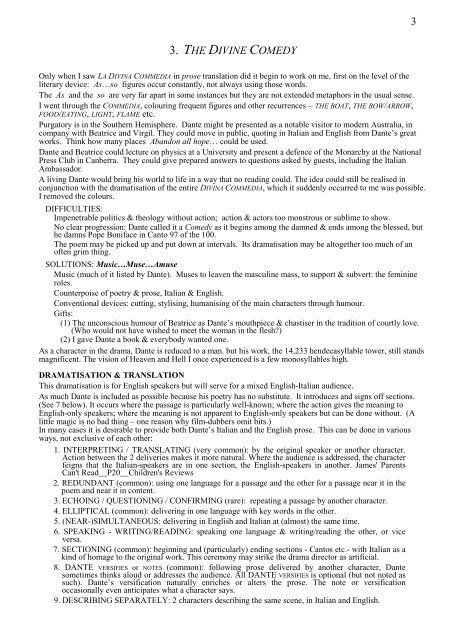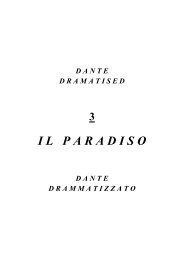You also want an ePaper? Increase the reach of your titles
YUMPU automatically turns print PDFs into web optimized ePapers that Google loves.
3. THE DIVINE COMEDY<br />
Only when I saw LA DIVINA COMMEDIA in prose translation did it begin to work on me, first on the level of the<br />
literary device: As…so figures occur constantly, not always using those words.<br />
The As and the so are very far apart in some instances but they are not extended metaphors in the usual sense.<br />
I went through the COMMEDIA, colouring frequent figures and other recurrences – THE BOAT, THE BOW/ARROW,<br />
FOOD/EATING, LIGHT, FLAME etc.<br />
Purgatory is in the Southern Hemisphere. Dante might be presented as a notable visitor to modern Australia, in<br />
company with Beatrice and Virgil. They could move in public, quoting in Italian and English from Dante’s great<br />
works. Think how many places Abandon all hope… could be used.<br />
Dante and Beatrice could lecture on physics at a University and present a defence of the Monarchy at the National<br />
Press Club in Canberra. They could give prepared answers to questions asked by guests, including the Italian<br />
Ambassador.<br />
A living Dante would bring his world to life in a way that no reading could. The idea could still be realised in<br />
conjunction with the dramatisation of the entire DIVINA COMMEDIA, which it suddenly occurred to me was possible.<br />
I removed the colours.<br />
DIFFICULTIES:<br />
Impenetrable politics & theology without action; action & actors too monstrous or sublime to show.<br />
No clear progression: Dante called it a Comedy as it begins among the damned & ends among the blessed, but<br />
he damns Pope Boniface in Canto 97 of the 100.<br />
The poem may be picked up and put down at intervals. Its dramatisation may be altogether too much of an<br />
often grim thing.<br />
SOLUTIONS: Music…Muse…Amuse<br />
Music (much of it listed by Dante). Muses to leaven the masculine mass, to support & subvert: the feminine<br />
roles.<br />
Counterpoise of poetry & prose, Italian & English.<br />
Conventional devices: cutting, stylising, humanising of the main characters through humour.<br />
Gifts:<br />
(1) The unconscious humour of Beatrice as Dante’s mouthpiece & chastiser in the tradition of courtly love.<br />
(Who would not have wished to meet the woman in the flesh?)<br />
(2) I gave Dante a book & everybody wanted one.<br />
As a character in the drama, Dante is reduced to a man. but his work, the 14,233 hendecasyllable tower, still stands<br />
magnificent. The vision of Heaven and Hell I once experienced is a few monosyllables high.<br />
DRAMATISATION & TRANSLATION<br />
This dramatisation is for English speakers but will serve for a mixed English-Italian audience.<br />
As much Dante is included as possible because his poetry has no substitute. It introduces and signs off sections.<br />
(See 7 below). It occurs where the passage is particularly well-known; where the action gives the meaning to<br />
English-only speakers; where the meaning is not apparent to English-only speakers but can be done without. (A<br />
little magic is no bad thing – one reason why film-dubbers omit bits.)<br />
In many cases it is desirable to provide both Dante’s Italian and the English prose. This can be done in various<br />
ways, not exclusive of each other:<br />
1. INTERPRETING / TRANSLATING (very common): by the original speaker or another character.<br />
Action between the 2 deliveries makes it more natural. Where the audience is addressed, the character<br />
feigns that the Italian-speakers are in one section, the English-speakers in another. James' Parents<br />
Can't Read__P20__Children's Reviews<br />
2. REDUNDANT (common): using one language for a passage and the other for a passage near it in the<br />
poem and near it in content.<br />
3. ECHOING / QUESTIONING / CONFIRMING (rare): repeating a passage by another character.<br />
4. ELLIPTICAL (common): delivering in one language with key words in the other.<br />
5. (NEAR-)SIMULTANEOUS: delivering in English and Italian at (almost) the same time.<br />
6. SPEAKING - WRITING/READING: speaking one language & writing/reading the other, or vice<br />
versa.<br />
7. SECTIONING (common): beginning and (particularly) ending sections - Cantos etc.- with Italian as a<br />
kind of homage to the original work. This ceremony may strike the drama director as artificial.<br />
8. DANTE VERSIFIES or NOTES (common): following prose delivered by another character, Dante<br />
sometimes thinks aloud or addresses the audience. All DANTE VERSIFIES is optional (but not noted as<br />
such). Dante’s versification naturally enriches or alters the prose. The note or versification<br />
occasionally even anticipates what a character says.<br />
9. DESCRIBING SEPARATELY: 2 characters describing the same scene, in Italian and English.<br />
3



